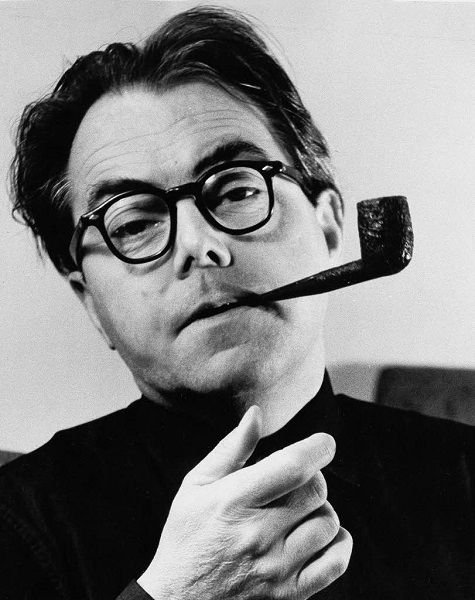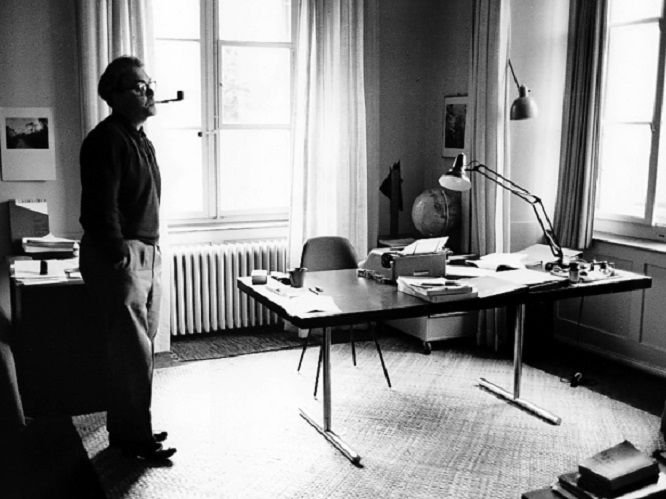It is well-known that if Prometheus is the purest creature of Hellenic folk thought, and Faust - a typical representative of the German national essence, then Don Juan is the embodiment of the Roman spirit. The image of the mockerymaker, the deceiver and the seducer, who dares to put himself above the divine order and human morality, still exists in Spanish folklore. However, his literary path began in the seventeenth century with the drama "The Trickster of Seville and the Stone Guest" of the monk Gabriel Teles, who became world famous under the pseudonym Tirso de Molina. For three centuries, the image of Don Juan has undergone many artistic transformations - to mention only the interpretations of Mollier, Mozart, Hoffman, Kierkegaard, Byron, Pushkin, and Bernard Shaw - but the most significant of them today is Max Frisch's comedy "Don Juan or Love to Geometry" published in 1953. To the text of the drama, the Swiss writer who lived from 1911 to 1991 added an essay in which he depicted the contemporary face of the Seville scammer. Don Juan, like any literary hero, has a circle of related images, says Max Frisch. And however much Ikar or Faust differs from him, they are still closer to him than Casanova. So there is no need for the actor to strain his mind to dampen the ladies' heads on the ground floor. The Don Juan glory of a seducer is a misconception by the ladies. He is an intellectual, although he is physically well-suited and has nothing to do with the enlightened cabinet scientist. What makes him irresistible to Seville's ladies is above all his spirituality. It is perceived as an offense because it is directed not to the woman but to other purposes and initially defines the woman as an episodic role - with the well-known result that this episode devours all of life to Don Juan. He is handsome in his steadfastness of life trials. He is not a pretty good man or Hercules. He is a toreador, almost a boy. Like the torreador, he fights with the bull, but he is not a bull himself. His hands are nervous - fine, but not subdued. "There is a constant question: is he a man?" Don Juan could be a dancer. His masculinity moves near the border with femininity. For him, it is not a matter of self-worth, but rather a precious possession that must be constantly defended because it is threatened. Don Juan's face is distinguished by the waking sight of a person over whom he has been in danger.

As for the infidelity, the most common disadvantage of any Don Juan, this means, according to Max Frisch, the following: not for the new passion he abandons the former; it repels everything that does not answer the truth. He abandons every woman not from love to the next, but from love for something higher than the woman - for example, geometry. His unbelief comes not from an overly powerful drive, but from the fear of self-deception, not from losing himself - that is the awake fear of the feminine in himself. Don Juan does not know love. The feeling he experiences has something of a sinister and disgusting nature - it reminds of a damp tropical sun over a marshy marsh, reminiscent of a jungle of creeping and winding plants where it can not be crossed without a naked sword. Don Juan is alone and among men, says Max Frisch. In his life there will always be someone Sagnarell or Leporello, but not Horatio. Men avoid it. Don Juan is unmarried because he seems to be feminine to men. Like most of us educated in literature, the young Don Juan is convinced that the love that a sunny day will come to him will surely be directed to a single woman, say, to Donja Anna, who has awakened this love to him. But from the very beginning, he anticipates what a great role he plays here, and when he learns from his own experience how easily the object of his youthful aspirations is easily replaced, he, the teenager in whom the person is awakened, feels deeply scared and embarrassed. There is a feeling that it is only a piece of nature, blind and unfortunate that Heaven is mocking about his quest for spirituality. This trauma gives rise to the constant need to laugh at Heaven, to provoke him in a fight through ridicule and mischief, and that means that Don Juan accepts the existence of Heaven. For Max Frisch, the shyness of Don Juan is especially important, which does not prevent him from being overwhelmed because he is hidden - externally, he does not manifest himself. Then what is his nationality, his souliness?
Don Juan, who does not kill, is unthinkable, even within a comedy. His death is as inherent as the child of the woman. The surprising thing is that we tend not to blame him for his murders, we hold him less than we do for a general. And not all his petty crimes, which every decent court (and hence the honored audience) should be condemned, somehow escape our indignation. We can hardly imagine a Don Juan who ends his days in jail! His prison is the world; or in other words: Don Juan is interesting only to the extent that he is able to escape our reproach - as a meteor, as a crash of his will, as a collision, whose devastating consequences show how far we are from paradise. If he lived these days, Don Juan (as I imagine) would probably be involved in nuclear physics: to know the truth. But his conflict with the feminine beginning, that is, the unconditional desire to preserve life, would remain the same. And as an atomic physicist, he will sooner or later face the choice: death or surrender - the surrender of that male spirit who, being self-absorbed, is obviously ready to blow the universe as soon as he only acquires the technical opportunity to do so. Behind every Don Juan is the boredom, though cleverly concealed by reckless courage. This is boredom, not full of forgiveness, but with annoyance - the boredom of the spirit that craves the absolute, but is convinced that it will never be able to achieve it. In short, this is the great boredom of melancholy, the heartbreak of a heart in which the desires are gone, so the only thing left is the wit. A Don Juan without a wit hung up.

The melancholic is thirsty to meet the absolute, but in the form of love and beauty. It is a thirst for what Plato calls the true purpose of Eros, a thirst for the highest good, which is the very reality - eternal and infinite. This longing for absolute is linked to melancholicism with the consciousness of its incomprehensibility. "Melancholia - this is the pain of the birth of eternity in man." The Absolute ... It is hardly to be expected from a contemporary dramaturge to put it in the image of the Stone Guest. But what do we do with this ghost-eerie scarecrow? Don Juan is unthinkable without him - without this borrowing of all sorts of legends. And only with parody we will not overcome this legacy. Parody suggests that the viewer deep in his heart still believes in the story that is parodying. But which one of our viewers believes that a routed deceiver can really rise and sit at our table? No, we do not believe it anymore. The one thing left is poetry, and in this sense the classic legend of the demolition of the blasphemous in hell will continue to live. Desperate by the impossibility of its being, in which it manifests itself not as a metaphysical thunderstorm, but as a mere boredom, Don Juan himself is now incarnating the legend of his collapse in hell. Indeed, he portrays it as an opera like a scam through which he wants to save himself; presents it as an art that only takes the form of something absolute; turns it into poetry. But ultimately it turns out that this legend, with which he laughs over the world, is in fact only an external, obscure expression of his real, inner and otherwise invisible, of his impudent true end. "
Don Juan of Max Frisch is not able to escape his theatrical existence; he looks like an actor accidentally caught in another, unknown play. That is why he is tormented by internal contradictions - the conflict is no longer between him and the world, he has infiltrated himself. This is how the legend of Don Juan, which originated in Spanish folklore, has reached our present day through many transformations. With Tirso de Molina, the human order is good, and Don Juan is bad because it violates the order by cheating women. At Moliere, public order is hypocritical, and Don Juan becomes two more hypocritical to use it. With Mozart, the world is filled with joy and woes, and Don Juan is a demonic seducer, the embodiment of perfect masculinity. In Hoffman, life is neglected, and Don Juan longs for perfection and perishes because of the mistaken choice. At Byron the world is a disgusting dungeon, and Don Juan is wonderful and women are his allies. And at Max Frisch, Don Juan is an invention of women, and the surrounding world destroys his identity: he fails to give up on his favorite geometry, and while his wife is expecting a child from him, in the theater of Seville they present the play of Tirso de Molina " deceiver and stone guest. " Thus the circle closes - from Tirso to Tirso, - but after three centuries literary life of a legend.
very excellent the story godflesh and excellent photo
Thank you :)
This post has received gratitude of 16.88% from @appreciator courtesy of @godflesh!
This nice post .I like you.
Thanks @sujonmia. Cheers!
Nice
:)